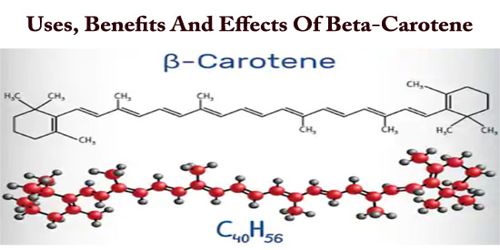Beta-Carotene (β-Carotene) is one of a group of red, orange, and yellow pigments called carotenoids. It is a member of the carotenes, which are terpenoids (isoprenoids), synthesized biochemically from eight isoprene units and thus having 40 carbons. Among the carotenes, β-carotene is distinguished by having beta-rings at both ends of the molecule. β-Carotene is biosynthesized from geranylgeranyl pyrophosphate. Beta carotene’s chemical formula – C40H56 – was discovered in 1907.
Beta-carotene is converted to vitamin A, an essential nutrient. It has antioxidant activity, which helps to protect cells from damage. The advantage of dietary beta carotene is that the body only converts as much as it needs. Excess vitamin A is toxic. Toxic vitamin A levels can occur if we consume too many supplements.
Uses and Benefits of Beta-carotene –
There are a number of ways that beta carotene can benefit human health. Below, we give some examples:
- Beta-carotene is an antioxidant – Beta-carotene, like all carotenoids, is an antioxidant. An antioxidant is a substance that inhibits the oxidation of other molecules; it protects the body from free radicals. Free radicals damage cells through oxidation. Eventually, the damage caused by free radicals can cause several chronic illnesses.
- Several studies have shown that antioxidants through diet help people’s immune systems, protect against free radicals, and lower the risk of developing cancer and heart disease. Some studies have suggested that those who consume at least four daily servings of beta carotene rich fruits and/or vegetables have a lower risk of developing cancer or heart disease.
- Beta-carotene may slow down cognitive decline – Men who have been taking beta carotene supplements for 15 or more years are considerably less likely to experience cognitive decline than other males, researchers from Harvard Medical School reported in Archives of Internal Medicine (November 2007 issue).
- Oxidative stress is thought to be a key factor in cognitive decline, the researchers explained. Studies have shown that antioxidant supplements may help prevent the deterioration of cognition.
- Their study, involving 4,052 men, compared those on beta carotene supplements for an average of 18 years to others who were given placebo. Over the short-term, they found no difference in cognitive decline risk between the two groups of men, but in the long-term it was clear that beta carotene supplements made a significant difference. The researchers emphasized that there may have been other factors which contributed to the slower decline in cognitive abilities among the men in the beta carotene group.
- Beta-carotene keeps lungs healthy as people age – The high blood beta carotene levels compensate for some of the damage to the lungs caused by oxygen free radicals. They measured the FEV1 of 535 participants and measured their beta carotene blood levels. FEV1 measures how much air you can breathe out in one go. They found that those with high beta carotene levels had much slower decline in FEV1 measures.
Prevent Breast Cancer and An eye disease called AMD – Eating more fruits and vegetable that contain beta-carotene seems decrease the risk of breast cancer in pre-menopausal women who are at high risk of getting breast cancer, including those with a family history and those who use alcohol excessively.
Taking beta-carotene by mouth along with vitamin C, vitamin E, and zinc daily, seems to help prevent vision loss and worsening of age-related macular degeneration (AMD) in people with advanced AMD. Taking beta-carotene plus antioxidants but without zinc does not seem to improve advanced AMD. There isn’t enough evidence to know taking beta-carotene along with other antioxidants works for people with less advanced macular disease. There is conflicting evidence about whether beta-carotene supplements can help reduce the risk of developing AMD.
Taking beta-carotene by mouth doesn’t appear to prevent the development of oral mucositis during radiation therapy or chemotherapy. Taking beta-carotene supplements alone or in combination with other antioxidants such as vitamin A or vitamin E doesn’t seem to reduce the risk of pancreatic cancer. Some evidence suggests that taking beta-carotene by mouth can improve sensitivity to sun exposure in people with polymorphous light eruptions. However, conflicting evidence exists.
Side Effects –
A French study involving adult females published in the Journal of the National Cancer Institute (September 2005 issue) found that smokers with high beta carotene levels had a higher risk of lung cancer and other smoking-related cancers than other smokers. They also found that non-smokers with high beta carotene intake had a lower risk of lung cancer.
They found that the risk of lung cancer over a ten-year period was:
181.8 per 10,000 women for non-smokers with low beta carotene intake
81.7 per 10,000 women for non-smokers with high beta carotene intake
174 per 10,000 women for smokers with low beta carotene intake
368.3 per 10,000 women for smokers with high beta carotene intake.
Further research has suggested that the high intake among smokers is nearly always due to supplements, and not food intake.
Excess β-carotene is predominantly stored in the fat tissues of the body. The most common side effect of excessive β-carotene consumption is carotenodermia, a physically harmless condition that presents as a conspicuous orange skin tint arising from deposition of the carotenoid in the outermost layer of the epidermis. Adults’ fat stores are often yellow from accumulated carotenoids, including β-carotene, while infant’s fat stores are white. Carotenodermia is quickly reversible upon cessation of excessive intakes.
Beta-carotene is Possibly Unsafe when taken by mouth in high doses, especially when taken long-term. High doses of beta-carotene can turn skin yellow or orange.
There is growing concern that taking high doses of antioxidant supplements such as beta-carotene might do more harm than good. Some research shows that taking high doses of beta-carotene supplements might increase the chance of death from all causes, increase the risk of certain cancers, and possibly other serious side effects. In addition, there is also concern that taking large amounts of a multivitamin plus a separate beta-carotene supplement increases the chance of developing advanced prostate cancer in men.
β-Carotene can interact with medication used for lowering cholesterol. Taking them together can lower the effectiveness of these medications and is considered only a moderate interaction. β-Carotene should not be taken with orlistat, a weight-loss medication, as orlistat can reduce the absorption of β-carotene by as much as 30%. Bile acid sequestrants and proton-pump inhibitors can also decrease absorption of β-carotene. Consuming alcohol with β-carotene can decrease its ability to convert to retinol and could possibly result in hepatotoxicity.
In people who smoke, beta-carotene supplements might increase the risk of colon, lung, and prostate cancer. Don’t take beta-carotene supplements if you smoke. In people who have been exposed to asbestos, beta-carotene supplements might increase the risk of cancer. There is some concern that when antioxidant vitamins, including beta-carotene, are used together they might have harmful effects after angioplasty. They can interfere with healing. Don’t use beta-carotene and other antioxidant vitamins before or after angioplasty without the recommendation of healthcare provider.
Dispersed β-carotene molecules can be encapsulated into carbon nanotubes enhancing their optical properties. Efficient energy transfer occurs between the encapsulated dye and nanotube light is absorbed by the dye and without significant loss is transferred to the nanotube. Encapsulation increases chemical and thermal stability of β-carotene molecules; it also allows their isolation and individual characterization.
Health Advise: People should be able to get the amount of beta-carotene they need by eating a varied and balanced diet. If they decide to take beta-carotene supplements, it’s important not to take too much as this could be harmful. Don’t take more than 7mg of beta-carotene supplements a day unless advised to by a doctor.
People who smoke or who have been exposed to asbestos are advised not to take any beta-carotene supplements.
Information Sources:















